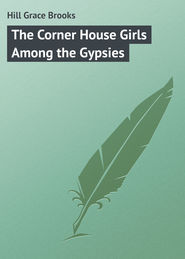По всем вопросам обращайтесь на: info@litportal.ru
(©) 2003-2024.
✖
The Corner House Girls on a Houseboat
Настройки чтения
Размер шрифта
Высота строк
Поля
“Yes, all of you!” laughed Mr. Howbridge. “That’s why I waited until school was out. They may come, may they not, Miss Ruth?” he asked. Always he was thus deferential to her when a question of family policy came up.
“Yes, I think so,” was the low-voiced answer. “But we planned to have an early tea and – ”
“Oh, I promise to get you back home in plenty of time,” the lawyer said, with a laugh. “And after that, if you like, we might take another ride.”
“How wonderful!” murmured Agnes.
“Won’t you stay to tea?” asked Ruth.
“I was waiting for that!” exclaimed Mr. Howbridge. “I shall be delighted. Now then, youngsters, run out and hop in, but don’t touch anything, or you may be in a worse predicament than when you were in the clothes basket elevator.”
“We won’t!” cried Tess and Dot, running down the walk.
“You must come back and be washed!” cried Ruth. It was a standing order – that, and the two little girls knew better than to disobey.
But first they inspected the new car, walking all around it, and breathing in, with the odor of gasoline, the awed remarks of some neighboring children.
“That’s part our car,” Dot told these envious ones, as she and Tess started back toward the house. “We’re going for a ride in it, and don’t you dare touch anything on it or Mr. Howbridge’ll be awful mad!”
“Um, oh, whut a lubly auto,” murmured Alfredia Blossom, who had come on an errand to her grandfather, Uncle Rufus. “Dat’s jest de beatenistest one I eber see!”
“Yes, it is nice,” conceded Tess, proudly, airily and condescendingly.
A little later the two younger children and Agnes sat in the rear seat, while Ruth was beside Mr. Howbridge at the steering wheel. Then the big car purred off down the street, like a contented cat after a saucer of warm milk.
“It was very good of you to come and get us,” said Ruth, when they were bowling along. “Almost the christening trip of the car, too, isn’t it?” she asked.
“The very first trip I have made in it,” was the answer. “I wanted it properly christened, you see. There is a method in my madness, too. I have an object in view, Martha.”
Sometimes he called Ruth this, fancifully, with the thought in mind that she was “cumbered with many cares.”
Again he would apply to her the nickname of “Minerva,” with its suggestion of wisdom. And Ruth rather liked these fanciful appellations.
“You have an object?” she repeated.
“Yes,” he answered. “As usual, I want your advice.”
“As if it was really worth anything to you!” she countered.
“It will be in this case, I fancy,” he went on with a smile. “I want your opinion about a canal boat.”
CHAPTER V – THE HOUSEBOAT
Ruth stole a quick glance at the face of her guardian. There was a silence between them for a moment, broken only by the purr of the powerful machine and the suction of the rubber tires on the street. Agnes, Dot and Tess were having a gay time behind the two figures on the front seat.
“A canal boat?” murmured Ruth, as if she had not heard aright.
“Perhaps I had better qualify that statement,” went on Mr. Howbridge in his courtroom voice, “by saying that it is, at present, Minerva, on the canal. And a boat on the canal is a canal boat, is it not? I ask for a ruling,” and he laughed as he slowed down to round a corner.
“I don’t know anything about your legal phraseology,” answered Ruth, entering into the bantering spirit of the occasion, “but I don’t see why a boat on the canal becomes a canal boat any more than a cottage pudding becomes a house. The pudding has no cottage in it any more than a club sandwich has a club in it and – ”
“I am completely at your mercy,” Mr. Howbridge broke in with. “But, speaking seriously, this boat is on the canal, though strictly it is not a canal boat. You know what they are, I dare say?”
“I used to have to take Tess and Dot down to the towpath to let them watch them often enough when we first came here,” said Ruth, with a laugh. “They used to think canal boats were the most wonderful objects in the world.”
“Are we going on a canal boat?” asked Tess, overhearing some of the talk on the front seat. “Oh, are we?”
“Oh, I hope we are!” added Dot. “My Alice-doll just loves canal boats. And wouldn’t it be splendiferous, Tess, if we could have a little one all to ourselves and Scalawag or maybe Billy Bumps to pull it instead of a mule?”
“That would be a sight on the towpath!” cried Agnes. “But what is this about canal boats, Mr. Howbridge?”
“Has some one opened a soda water store on board one?” asked Dot suddenly.
“Not exactly. You’ll see, presently. But I do want your opinion,” he went on, speaking directly to Ruth now, “and it has to do with a boat on a canal.”
“I still think you are joking,” she told him. “And except for the fact that we have a canal here in Milton I should think you were trying to fool me.”
“Impossible, Minerva,” he replied, soberly enough.
As Ruth had said, Milton was located on both the canal and a river, the two streams, if a canal can be called a stream, joining at a certain point, so that boats could go from one to the other. Gentory River, which acted as a feeder to one section of the canal, also connected with Lake Macopic, a large body of water. The lake contained many islands.
The automobile skirted the canal by a street running parallel to it, and then Mr. Howbridge turned down a rather narrow street, on which were situated several stores that sold supplies to the canal boats, and brought his machine to a stop on the bank of the waterway beside the towpath, as it is called from the fact that the mules or horses towing the boats walk along that level stretch of highway bordering the canal and forming part of the canal property.
At this part of the canal, the stream widened and formed a sort of harbor for boats of various kinds. It was also a refitting station; a place where a captain might secure new mules, hire helpers, buy grain for his animals and also victuals for himself and family; for the owners of the canal boats often lived aboard them. This place, known locally as “Henderson’s Cove,” was headquarters for all the canal boatmen of the vicinity.
“Here is where we disembark, to use a nautical term,” said Mr. Howbridge, with a smile at the younger children.
“Is this where we take the boat?” asked Dot eagerly.
“You might call it that,” said Mr. Howbridge, with another genial smile. “And now, Martha, to show that I was in earnest, there is the craft in question,” and he pointed to an old hulk of a canal boat, which had seen its best days.
“That! You want my opinion on that?” cried the girl, turning to her guardian in some surprise.
“Oh, no, the one next to it. The Bluebird.”
Ruth changed her view, and saw a craft which brought to her lips exclamations of delight, no less than to the lips of her sisters. For it was not a “rusty canaler” they beheld, but a trim craft, a typical houseboat, with a deck covered with a green striped awning and set with willow chairs, and a cabin, the windows of which, through their draped curtains, gave hint of delights within.
“Oh, how lovely!” murmured Agnes.
“A dream!” whispered Ruth. “But why do you bring us here to show us this?” she asked with much interest.
“Because,” began Mr. Howbridge, “I want to know if you would like – ”
Just then an excited voice behind the little party burst out with:
“Oh, Mr. Howbridge, I’ve been looking everywhere for you!” Neale O’Neil came hurrying along the towpath, seemingly much excited.
“I hope that Supreme Court decision hasn’t gone against me,” Ruth heard her guardian murmur. “If that case is lost – ”
“Yes, I think so,” was the low-voiced answer. “But we planned to have an early tea and – ”
“Oh, I promise to get you back home in plenty of time,” the lawyer said, with a laugh. “And after that, if you like, we might take another ride.”
“How wonderful!” murmured Agnes.
“Won’t you stay to tea?” asked Ruth.
“I was waiting for that!” exclaimed Mr. Howbridge. “I shall be delighted. Now then, youngsters, run out and hop in, but don’t touch anything, or you may be in a worse predicament than when you were in the clothes basket elevator.”
“We won’t!” cried Tess and Dot, running down the walk.
“You must come back and be washed!” cried Ruth. It was a standing order – that, and the two little girls knew better than to disobey.
But first they inspected the new car, walking all around it, and breathing in, with the odor of gasoline, the awed remarks of some neighboring children.
“That’s part our car,” Dot told these envious ones, as she and Tess started back toward the house. “We’re going for a ride in it, and don’t you dare touch anything on it or Mr. Howbridge’ll be awful mad!”
“Um, oh, whut a lubly auto,” murmured Alfredia Blossom, who had come on an errand to her grandfather, Uncle Rufus. “Dat’s jest de beatenistest one I eber see!”
“Yes, it is nice,” conceded Tess, proudly, airily and condescendingly.
A little later the two younger children and Agnes sat in the rear seat, while Ruth was beside Mr. Howbridge at the steering wheel. Then the big car purred off down the street, like a contented cat after a saucer of warm milk.
“It was very good of you to come and get us,” said Ruth, when they were bowling along. “Almost the christening trip of the car, too, isn’t it?” she asked.
“The very first trip I have made in it,” was the answer. “I wanted it properly christened, you see. There is a method in my madness, too. I have an object in view, Martha.”
Sometimes he called Ruth this, fancifully, with the thought in mind that she was “cumbered with many cares.”
Again he would apply to her the nickname of “Minerva,” with its suggestion of wisdom. And Ruth rather liked these fanciful appellations.
“You have an object?” she repeated.
“Yes,” he answered. “As usual, I want your advice.”
“As if it was really worth anything to you!” she countered.
“It will be in this case, I fancy,” he went on with a smile. “I want your opinion about a canal boat.”
CHAPTER V – THE HOUSEBOAT
Ruth stole a quick glance at the face of her guardian. There was a silence between them for a moment, broken only by the purr of the powerful machine and the suction of the rubber tires on the street. Agnes, Dot and Tess were having a gay time behind the two figures on the front seat.
“A canal boat?” murmured Ruth, as if she had not heard aright.
“Perhaps I had better qualify that statement,” went on Mr. Howbridge in his courtroom voice, “by saying that it is, at present, Minerva, on the canal. And a boat on the canal is a canal boat, is it not? I ask for a ruling,” and he laughed as he slowed down to round a corner.
“I don’t know anything about your legal phraseology,” answered Ruth, entering into the bantering spirit of the occasion, “but I don’t see why a boat on the canal becomes a canal boat any more than a cottage pudding becomes a house. The pudding has no cottage in it any more than a club sandwich has a club in it and – ”
“I am completely at your mercy,” Mr. Howbridge broke in with. “But, speaking seriously, this boat is on the canal, though strictly it is not a canal boat. You know what they are, I dare say?”
“I used to have to take Tess and Dot down to the towpath to let them watch them often enough when we first came here,” said Ruth, with a laugh. “They used to think canal boats were the most wonderful objects in the world.”
“Are we going on a canal boat?” asked Tess, overhearing some of the talk on the front seat. “Oh, are we?”
“Oh, I hope we are!” added Dot. “My Alice-doll just loves canal boats. And wouldn’t it be splendiferous, Tess, if we could have a little one all to ourselves and Scalawag or maybe Billy Bumps to pull it instead of a mule?”
“That would be a sight on the towpath!” cried Agnes. “But what is this about canal boats, Mr. Howbridge?”
“Has some one opened a soda water store on board one?” asked Dot suddenly.
“Not exactly. You’ll see, presently. But I do want your opinion,” he went on, speaking directly to Ruth now, “and it has to do with a boat on a canal.”
“I still think you are joking,” she told him. “And except for the fact that we have a canal here in Milton I should think you were trying to fool me.”
“Impossible, Minerva,” he replied, soberly enough.
As Ruth had said, Milton was located on both the canal and a river, the two streams, if a canal can be called a stream, joining at a certain point, so that boats could go from one to the other. Gentory River, which acted as a feeder to one section of the canal, also connected with Lake Macopic, a large body of water. The lake contained many islands.
The automobile skirted the canal by a street running parallel to it, and then Mr. Howbridge turned down a rather narrow street, on which were situated several stores that sold supplies to the canal boats, and brought his machine to a stop on the bank of the waterway beside the towpath, as it is called from the fact that the mules or horses towing the boats walk along that level stretch of highway bordering the canal and forming part of the canal property.
At this part of the canal, the stream widened and formed a sort of harbor for boats of various kinds. It was also a refitting station; a place where a captain might secure new mules, hire helpers, buy grain for his animals and also victuals for himself and family; for the owners of the canal boats often lived aboard them. This place, known locally as “Henderson’s Cove,” was headquarters for all the canal boatmen of the vicinity.
“Here is where we disembark, to use a nautical term,” said Mr. Howbridge, with a smile at the younger children.
“Is this where we take the boat?” asked Dot eagerly.
“You might call it that,” said Mr. Howbridge, with another genial smile. “And now, Martha, to show that I was in earnest, there is the craft in question,” and he pointed to an old hulk of a canal boat, which had seen its best days.
“That! You want my opinion on that?” cried the girl, turning to her guardian in some surprise.
“Oh, no, the one next to it. The Bluebird.”
Ruth changed her view, and saw a craft which brought to her lips exclamations of delight, no less than to the lips of her sisters. For it was not a “rusty canaler” they beheld, but a trim craft, a typical houseboat, with a deck covered with a green striped awning and set with willow chairs, and a cabin, the windows of which, through their draped curtains, gave hint of delights within.
“Oh, how lovely!” murmured Agnes.
“A dream!” whispered Ruth. “But why do you bring us here to show us this?” she asked with much interest.
“Because,” began Mr. Howbridge, “I want to know if you would like – ”
Just then an excited voice behind the little party burst out with:
“Oh, Mr. Howbridge, I’ve been looking everywhere for you!” Neale O’Neil came hurrying along the towpath, seemingly much excited.
“I hope that Supreme Court decision hasn’t gone against me,” Ruth heard her guardian murmur. “If that case is lost – ”











